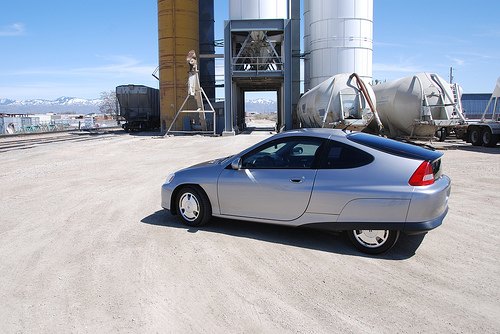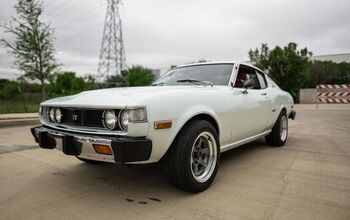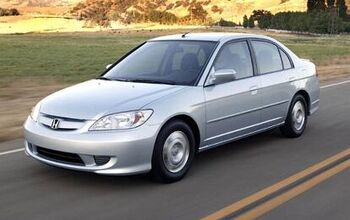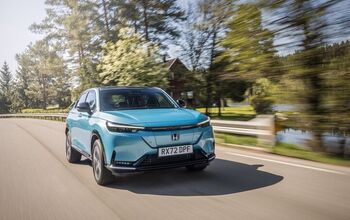Hammer Time: 50,000 Honda Hybrid Miles
I am not in the ‘keeper’ business. Cars to me have always been an investment asset, like stocks, bonds, and a good accountant are for most other folks. My daily drivers are supposed to make me money. But then I have to balance this against one other unavoidable fact: I’m married.
With two kids, a wife, a home, and a long list of future obligations, I have to make my daily drivers ‘work’ for me. So it came to be that two older hybrids entered the family garage. A 2003 Honda Civic Hybrid and a 2001 Honda Insight. As all of you know, I’m a tight bastard when it comes to money. My mindset is always in penny pincher mode. So like any other frugal zealot, I sat down and did the numbers while driving them a combined 50,000 miles. The findings?
Hybrids are ‘financially’ the absolute best buy if you fit three criteria. First off you have to be a ‘keeper’ who drives a lot. I’m talking at least 10 to 12 years of service for your commuter and at least 15k miles a year. In the 27,000 miles my wife has driven the Civic it’s averaged 42 mpg. The Insights 25k gave us 55 mpg. Those are amazingly strong numbers for what amounts to 50/50 driving between town and highway. I would expect that the Prius would have hit in the high 40’s and even the lesser-loved Accord and Camry variants would have likely hit around the high 30’s given what’s around the web. If we were to keep both these used Hondas for a full 200k combined, our savings on gas would be right around the $15,000 range with the majority going to the Insight. Even if you spent half of that on maintenance you’ll be far ahead.
Second, you can’t be an aggressive driver. When you press the pedal to the lightened aluminum metal both cars effectively say, “Oh, let me think about that!”. If you have ever owned an underpowered diesel with a slushbox, the Civic and Insight with the kinder and gentler slushbox gives you the exact same lack of initial response. It’s not dangerous in the real world. Like their overburdened diesel brethren, hybrids actively encourage more cruising and foresight than a normal car. So most folks whether they like it or not become comfortable with a defensive driving style in short time.
Eventually you get to where you need to go. Just not right now… in a few extra seconds… yes…there it is! Then it’s a slo-mo deal. These earlier hybrids are constantly playing the numbers game and flat out acceleration is never a part of it.
Unfortunately there’s one other ingredient that you must consider in the hybrid’s recipe that separates the good from the drek. There’s a quality issue… and boy what an issue it is when it comes to hybrids. The first generation Insight was essentially a $35,000+ vehicle that sold for $20,000. It is without doubt the most over-engineered car I have ever experienced given it’s price point. The body is not only devoid of squeaks and rattles. It feels like what I would term a ‘vault of precision’, and this came with 140,000+ miles in the nasty roads and road salt of Massachusetts.
The 2002 S-Class I have doesn’t even remotely compare to it. A 2003 Camry I had recently? A complete joke compared with the Insight. Other than the 1st generation Prius and the 1st gen LS/SC 400, it’s impossible to find a car that was so far ahead of the curve when it comes to it’s contemporaries. My view on the Insight from my last review hasn’t changed one bit.
The 2003 Civic Hybrid on the other hand is a buggy little bastard and most ‘keepers’ will agree with that statement. Honda decided to take the Insight’s powertrain, add a cylinder, and shove it into a car that’s 40% heavier. When you’re on the road and everything works, it’s wonderful. You can still hit the mid-50’s in the highway with a light foot, and the dashboard display for the Civic is perhaps the best one ever put on a hybrid vehicle. Forget the stupid leaves and glowing green and blue of the current breed. I’m absolutely convinced that simple gauges that minimize eye darting are the way to go. The Civic unpretentiously gives you all the information you need without having to constantly ‘interact’ with the dash. Good job Honda.
Unfortunately I can’t recommend the rest of this particular model to the non-enthusiast. In order to make the transmissions last on these vehicles, you really have to do a drain and fill once a year. It’s not an option without it. The transmissions will need to be serviced as frequently as a 1990’s minivan or else they will join the long chorus line of Civic hybrids with bad trannies that are now in ‘wholesale heaven’ at the dealer auctions. If you’re the type that stomps on the gas, go with something that has nearly indestructible planetary gears (Prius) or is light enough to handle the task (Insight). Better yet, just get a diesel.
But what if you’re willing to be a diligent maintainer? Well then. Then the third thing you have to do is become a collector of certain specific parts. As a long-time brick enthusiast I’m familiar with the drill. But unlike the light bulb chewing 240’s and 940’s , a Civic Hybrid isn’t content with the little things. I’m talking about everything involving the battery along with that overmatched transmission.
Why? Because the cost of replacing all those parts borders on Rolls-Royce territory. I had the MCM (the module that lets the engine and battery work together) go south on the Honda Civic. It took months to figure it out and the cost of the part from Honda of America was $1800+. At the junkyard this part was $100.
In fact it wasn’t even listed in their database. I had to literally navigate my way through the Georgia mud and bring my toolbox to get the part out of the car. But I found it along with a treasure trove that was a battery (they usually last 120k to 150k) and a recently replaced transmission. Long story short, you have to be willing to go out of your way to make the Civic Hybrid work for you because the wonks at Honda simply put the Insight’s IMA hybrid system without giving the Civic a warranty that reflects the heavier load. In fact the Insight offers an even stronger warranty than the Civic.
My conclusion? Well, there’s two of course. As a commuter it’s virtually impossible to beat the original Honda Insight. Even a $1000 beater with 35 mpg to boot will fall short of the Insight’s penurious nature in these coming years. It consumes far less gas. Oil changes and other fluids come to about half a conventional car’s cost (2.5 quart oil capacity, with tighter engine tolerances) and virtually all the maintenance on it is cheap and easy. Plus it’s a design that lends itself to the mechanically curious. For all the complexity that a Hybrid is supposed to represent, the Insight is really a refreshingly simple design. Too bad they made fewer than 3,000 of them a year on average and will never make them again.
A 2003 – 2005 Honda Civic hybrid will work well if you
A) Seek and find the battery, transmission, and related parts that Honda won’t warranty.
Damn me for doing it, but I’m going to keep them both. Sure the Prius or even a plain-jane Civic would likely be cheaper in the long run than my wife’s Civic. But I’m betting that all these 1st generation Civic Hybrids will become junkyard fodder in a far quicker period of time. Maybe someone out there will find a way to make the trannys more robust and the batteries less privy to failure. Heck, there’s an enthusiast site already focusing on these needs right now. Time will tell but for now, I’d rather invest in my neighboring junkyards and Honda’s R&D than the Arab dictatorships or Russian mafia. I think it will pay off.
More by Steven Lang
Latest Car Reviews
Read moreLatest Product Reviews
Read moreRecent Comments
- Corey Lewis It's not competitive against others in the class, as my review discussed. https://www.thetruthaboutcars.com/cars/chevrolet/rental-review-the-2023-chevrolet-malibu-last-domestic-midsize-standing-44502760
- Turbo Is Black Magic My wife had one of these back in 06, did a ton of work to it… supercharger, full exhaust, full suspension.. it was a blast to drive even though it was still hilariously slow. Great for drive in nights, open the hatch fold the seats flat and just relax.Also this thing is a great example of how far we have come in crash safety even since just 2005… go look at these old crash tests now and I cringe at what a modern electric tank would do to this thing.
- MaintenanceCosts Whenever the topic of the xB comes up…Me: "The style is fun. The combination of the box shape and the aggressive detailing is very JDM."Wife: "Those are ghetto."Me: "They're smaller than a Corolla outside and have the space of a RAV4 inside."Wife: "Those are ghetto."Me: "They're kind of fun to drive with a stick."Wife: "Those are ghetto."It's one of a few cars (including its fellow box, the Ford Flex) on which we will just never see eye to eye.
- Oberkanone The alternative is a more expensive SUV. Yes, it will be missed.
- Ajla I did like this one.


































Comments
Join the conversation
Seriously, someone explain to me why they stopped making the original insight? I would love to be able to buy something like that, a pure commuter car for the daily slog into the city. I just don't get it, it got better MPG than any other mass produced hybrid, did they not want that feather in their cap? Did they just want to prove that they could and then tell us to fuck off? Did it just work too well, was the mechanics union crying about not having enough expensive hybrid repairs? Maybe it lasted too long, The dealers were pitching a fit because there was not enough "planned obsolescence"? The new insight is crap, the civic hybrid is crap, the accord hybrid was awesome for spinning tires but not in the MPG realm. God help us, they think the CR-Z is what we want *facepalm
You've got me really wanting to buy a 1st gen Insight. It does make a lot of sense for me. They're not too expensive now, the battery has a long warranty, and I could save hundreds on fuel. Put some nice summer tires on that thing and I bet it could handle. It's lightweight enough. I think that I could get used to the lack of power.